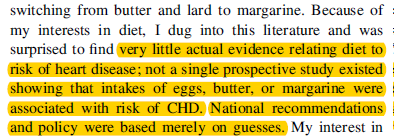
Nutrition made critical.
PhD | MPH | MAT | RDN | LDN.
Writer at https://t.co/rwiMIWycai. Views are my own.
DMs open. Tell me how you can help us change the world.
How to get URL link on X (Twitter) App


https://twitter.com/ChristianTams/status/1361306095034261508Germ theory proponents thought pellagra was caused by a microbe transmitted easily through poor populations because of lack of indoor plumbing.

https://twitter.com/neighborchick/status/1335491738186596355
 Because we must make SURE that poor health in the US is the fault of the consumer ONLY & has nothing to do with how the DGA have warped our food system, our nutrition education, our health interventions, & our very concept of what a "healthy diet" is.
Because we must make SURE that poor health in the US is the fault of the consumer ONLY & has nothing to do with how the DGA have warped our food system, our nutrition education, our health interventions, & our very concept of what a "healthy diet" is.

https://twitter.com/Tom_Babington1/status/1335313489620033546Twitter summary - The DGA:

https://twitter.com/ChristianTams/status/1335270622302244867Okay. Let's look at the food environment.
https://twitter.com/Edival/status/1325592107831103489I've been trying to avoid going here, but here I go.

 Nutrition as it relates to chronic disease and agricultural management of the food supply as it relates to climate change are (relatively) young scientific fields.
Nutrition as it relates to chronic disease and agricultural management of the food supply as it relates to climate change are (relatively) young scientific fields.https://twitter.com/lacalladine/status/12938214930932408341st, lower fat, higher carb national dietary guidelines *began* as a clinical intervention for high risk patients. Then (as now) docs who were trying to the right thing for patients in their care, read research & advised their (high risk) patients accordingly. 2/
https://twitter.com/raphaels7/status/1263471303983595523Mechanisms acting at cellular levels do not necessarily give full explanations of physiological level effects & outcomes. Metabolism is too complicated for that.
https://twitter.com/ChristianTams/status/1246058826547302402They were told to

https://twitter.com/jdolphin2572/status/1243195119911788548First, I don't think we can completely ignore this incident, from around 2008-2009: nmsociety.org/2018/02/18/ann…
https://twitter.com/CakeNutrition/status/1228175904448237570Who even pays attention to the Dietary Guidelines anyway?
https://twitter.com/CakeNutrition/status/1215276822734278658She and I agreed that the world of diabetes educators & the world of clinicians who use therapeutic carbohydrate restriction to treat diabetes are waaaay too far apart. We could learn a lot from each other. 2/11
https://twitter.com/mrc314/status/1185671245284757506Before the DGA, "healthy food" (or "healthy diet") meant "foods that fulfilled adequate essential nutrition needs."
https://twitter.com/AmandaZZ100/status/1183385832058687493The creation of the 1977 Dietary Goals & 1980 Dietary Guidelines emerged from & amplified a seismic shift in how we think about public health.
https://twitter.com/janvyjidak/status/1176385616331907072The textbook & guideline makers have been getting it wrong since around 1977, when the collective thinking in nutrition took a hard turn away from science, prompted (largely) by US nutrition policy. Because policy *can* & *does* warp science (see Hite & Carter, 2019 in RHM),
https://twitter.com/Rd2wellness/status/1163804837915570176The Dietary Guidelines for Americans (DGA, 1980) were, in part, a response to the fact that the medical-pharma enterprise COULD NOT reverse/prevent chronic disease.
https://twitter.com/Botanygeek/status/1149954823699259392It's quite another thing to say, "Fruit is bred to be 100x sweeter than in the past." Patient food/BG records support the first statement. But what is the second statement based on? Seems like it probably should be true? Fruit tasted different when I was a kid? 2/5